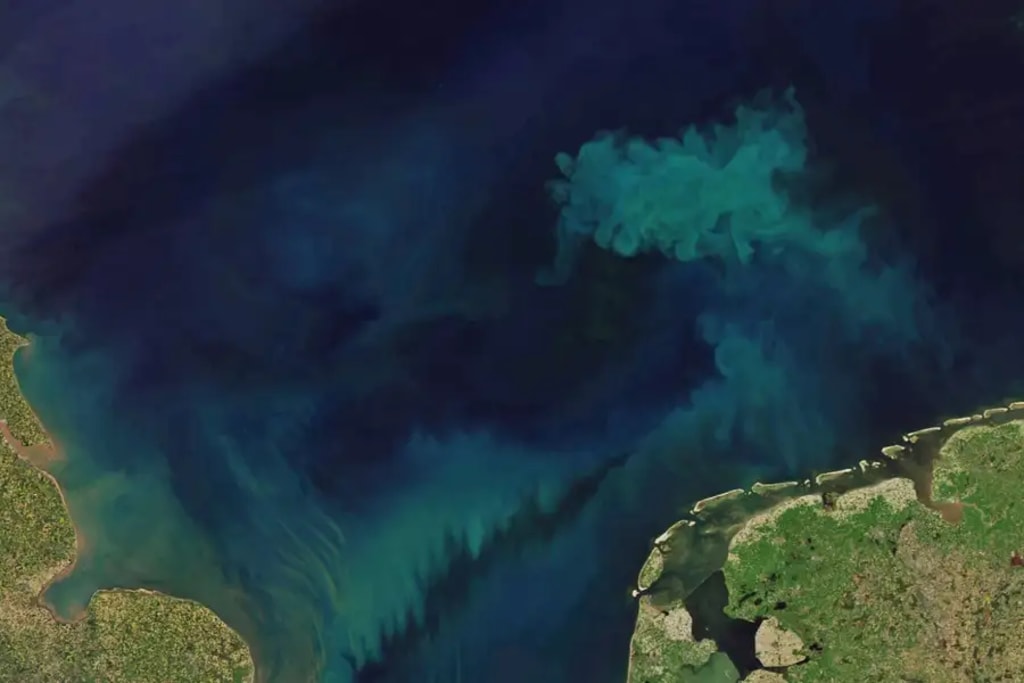Rising Temperatures Turning Our Oceans Green
The oceans are turning greener due to rising temperatures, and that this could have a number of implications for the planet.

A new study published in the journal Nature has found that the oceans are turning greener in the last two decades due to rising temperatures. The study, which was conducted by researchers from the National Oceanography Centre, Massachusetts Institute of Technology, and Oregon State University, used data from the MODIS instrument on NASA's Aqua satellite to monitor changes in ocean color from 2002 to 2022.
The study found that “significant” changes in color have occurred over 56% of the world's ocean in this time, with an overall trend towards more green. The researchers say that the most likely cause for the color changes is a strengthening of ocean stratification, which describes the natural division between less dense warm waters at the surface and cooler, denser water below.
As the ocean warms, the upper ocean becomes more stratified. This means that the nutrients that phytoplankton need to grow are more concentrated in the surface waters. Phytoplankton are microscopic organisms that are the base of the marine food web. They produce about half of the oxygen in the Earth's atmosphere, and they also play a role in absorbing carbon dioxide from the atmosphere.
The study's findings suggest that climate change is having a significant impact on the oceans. The greening of the oceans could have a number of implications, including changes in the marine food web, the absorption of carbon dioxide from the atmosphere, and the production of oxygen.
The researchers say that more research is needed to understand the full implications of the greening of the oceans. However, they warn that the findings are a “wake-up call” about the need to take action to address climate change.
Here are some of the implications of the greening of the oceans:
Changes in the marine food web: The greening of the oceans could lead to changes in the marine food web. Phytoplankton are the base of the marine food web, and so changes in their abundance could have a knock-on effect on other organisms in the food web.
Absorption of carbon dioxide from the atmosphere: The greening of the oceans could also lead to an increase in the absorption of carbon dioxide from the atmosphere. Phytoplankton use carbon dioxide to grow, and so an increase in their abundance could lead to an increase in the amount of carbon dioxide that is removed from the atmosphere.
Production of oxygen: The greening of the oceans could also lead to an increase in the production of oxygen. Phytoplankton produce oxygen as a byproduct of photosynthesis, and so an increase in their abundance could lead to an increase in the amount of oxygen that is produced in the oceans.
Here are some of the things that we can do to address the greening of the oceans:
Reduce our emissions of greenhouse gases. This will help to slow the rate of climate change and reduce the amount of stress that is placed on the oceans.
Protect marine ecosystems. This will help to ensure that phytoplankton populations remain healthy and that the marine food web is not disrupted.
Support research into the greening of the oceans. This will help us to better understand the implications of the greening of the oceans and to develop effective mitigation strategies.
The greening of the oceans is a serious issue that needs to be addressed. Climate change is the main driver of the greening of the oceans, and so taking action to address climate change is essential. We also need to better understand the implications of the greening of the oceans so that we can mitigate its effects.





Comments
There are no comments for this story
Be the first to respond and start the conversation.